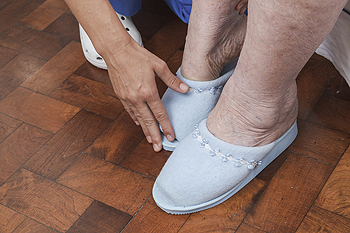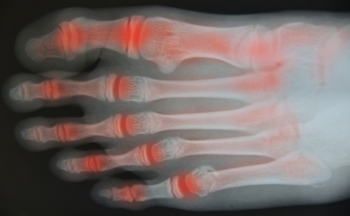Blog
Do your Child's Feet Hurt?
Diabetes and Neuropathy
 The definition of neuropathy is nerve damage, and it may be a result of many medical conditions that may be present. There are several symptoms that may be indicative of this condition, including tingling in the feet, burning sensations, or extreme sensitivity or pain when touched. Additionally, many patients are aware of muscle weakness and may find it difficult to urinate. Neuropathy may develop as a result of elevated sugar levels in the blood, and research has shown that diabetes accounts for sixty percent of neuropathy issues. If you are a diabetic patient and are experiencing any of these symptoms, it is strongly suggested to confer with a podiatrist who can perform a proper diagnosis and determine the best course of treatment for you.
The definition of neuropathy is nerve damage, and it may be a result of many medical conditions that may be present. There are several symptoms that may be indicative of this condition, including tingling in the feet, burning sensations, or extreme sensitivity or pain when touched. Additionally, many patients are aware of muscle weakness and may find it difficult to urinate. Neuropathy may develop as a result of elevated sugar levels in the blood, and research has shown that diabetes accounts for sixty percent of neuropathy issues. If you are a diabetic patient and are experiencing any of these symptoms, it is strongly suggested to confer with a podiatrist who can perform a proper diagnosis and determine the best course of treatment for you.
Neuropathy
Neuropathy can be a potentially serious condition, especially if it is left undiagnosed. If you have any concerns that you may be experiencing nerve loss in your feet, consult with Dr. Frederick Quirante from Texas. Our doctor will assess your condition and provide you with quality foot and ankle treatment for neuropathy.
What is Neuropathy?
Neuropathy is a condition that leads to damage to the nerves in the body. Peripheral neuropathy, or neuropathy that affects your peripheral nervous system, usually occurs in the feet. Neuropathy can be triggered by a number of different causes. Such causes include diabetes, infections, cancers, disorders, and toxic substances.
Symptoms of Neuropathy Include:
- Numbness
- Sensation loss
- Prickling and tingling sensations
- Throbbing, freezing, burning pains
- Muscle weakness
Those with diabetes are at serious risk due to being unable to feel an ulcer on their feet. Diabetics usually also suffer from poor blood circulation. This can lead to the wound not healing, infections occurring, and the limb may have to be amputated.
Treatment
To treat neuropathy in the foot, podiatrists will first diagnose the cause of the neuropathy. Figuring out the underlying cause of the neuropathy will allow the podiatrist to prescribe the best treatment, whether it be caused by diabetes, toxic substance exposure, infection, etc. If the nerve has not died, then it’s possible that sensation may be able to return to the foot.
Pain medication may be issued for pain. Electrical nerve stimulation can be used to stimulate nerves. If the neuropathy is caused from pressure on the nerves, then surgery may be necessary.
If you have any questions, please feel free to contact our office located in Nederland, TX. We offer the newest diagnostic and treatment technologies for all your foot care needs.
Read more about NeuropathyToe Arthritis
 If you are experiencing pain and discomfort in your big toe, you may have a foot condition that is known as toe arthritis. It may be caused by wearing shoes that are too tight and may not have adequate room for the toes to move about in. One of the first signs that may be indicative of toe arthritis may be pain that is felt in the toes. Many people feel stiffness in the toes, and this may be a result of the diminished cartilage that is located between the joints, in addition to obvious redness and swelling of the toes and surrounding area. If you are afflicted with this condition, it may be difficult to perform daily activities that may include walking or standing for extended periods of time. If you are experiencing arthritis in your feet or toes, it is suggested to speak with a podiatrist who can advise you on correct treatment options.
If you are experiencing pain and discomfort in your big toe, you may have a foot condition that is known as toe arthritis. It may be caused by wearing shoes that are too tight and may not have adequate room for the toes to move about in. One of the first signs that may be indicative of toe arthritis may be pain that is felt in the toes. Many people feel stiffness in the toes, and this may be a result of the diminished cartilage that is located between the joints, in addition to obvious redness and swelling of the toes and surrounding area. If you are afflicted with this condition, it may be difficult to perform daily activities that may include walking or standing for extended periods of time. If you are experiencing arthritis in your feet or toes, it is suggested to speak with a podiatrist who can advise you on correct treatment options.
Arthritis can be a difficult condition to live with. If you are seeking treatment, contact Dr. Frederick Quirante from Texas. Our doctor can provide the care you need to keep you pain-free and on your feet.
Arthritic Foot Care
Arthritis is a joint disorder that involves the inflammation of different joints in your body, such as those in your feet. Arthritis is often caused by a degenerative joint disease and causes mild to severe pain in all affected areas. In addition to this, swelling and stiffness in the affected joints can also be a common symptom of arthritis.
In many cases, wearing ill-fitting shoes can worsen the effects and pain of arthritis. Wearing shoes that have a lower heel and extra room can help your feet feel more comfortable. In cases of rheumatoid arthritis, the arch in your foot may become problematic. Buying shoes with proper arch support that contour to your feet can help immensely.
Alleviating Arthritic Pain
- Exercises that stretch the foot can prevent further pain and injury and increase mobility
- Most of the pain can be alleviated with anti-inflammatory drugs, heat, and topical medications
- Massages can help temporarily alleviate pain.
It is best to see your doctor for the treatment that is right for your needs and symptoms. Conditions vary, and a podiatrist can help you determine the right method of care for your feet.
If you have any questions, please feel free to contact our office located in Nederland, TX. We offer the newest diagnostic tools and technology to treat your foot and ankle needs.
Read more about Arthritic Foot CareWhat is Plantar Fasciitis?
 There is a portion of tissue that is located on the bottom of the foot, which is referred to as the plantar fascia. The function of this part of the foot is to connect the toes to the heel bone. If this should become damaged as a result of an injury or repeated strain the foot may have endured, plantar fasciitis may develop and may typically cause severe pain and discomfort. Research has shown this is the most common form of heel pain, and noticeable symptoms may accompany this condition. Many patients may find it difficult to walk as a result of pressure on the heel, and this may be more severe as the first steps are taken in the morning. There are conditions that may exist, which may lead to the development of this condition, including having high arches in the feet, standing for extended periods of time, or wearing shoes that do not fit properly. If you have developed this painful condition, it is strongly suggested to seek the counsel of a podiatrist, who can perform a proper diagnosis and provide advice on correct treatment options.
There is a portion of tissue that is located on the bottom of the foot, which is referred to as the plantar fascia. The function of this part of the foot is to connect the toes to the heel bone. If this should become damaged as a result of an injury or repeated strain the foot may have endured, plantar fasciitis may develop and may typically cause severe pain and discomfort. Research has shown this is the most common form of heel pain, and noticeable symptoms may accompany this condition. Many patients may find it difficult to walk as a result of pressure on the heel, and this may be more severe as the first steps are taken in the morning. There are conditions that may exist, which may lead to the development of this condition, including having high arches in the feet, standing for extended periods of time, or wearing shoes that do not fit properly. If you have developed this painful condition, it is strongly suggested to seek the counsel of a podiatrist, who can perform a proper diagnosis and provide advice on correct treatment options.
Plantar fasciitis can be very painful and inconvenient. If you are experiencing heel pain or symptoms of plantar fasciitis, contact Dr. Frederick Quirante from Texas. Our doctor can provide the care you need to keep you pain-free and on your feet.
What Is Plantar Fasciitis?
Plantar fasciitis is the inflammation of the thick band of tissue that runs along the bottom of your foot, known as the plantar fascia, and causes mild to severe heel pain.
What Causes Plantar Fasciitis?
- Excessive running
- Non-supportive shoes
- Overpronation
- Repeated stretching and tearing of the plantar fascia
How Can It Be Treated?
- Conservative measures – anti-inflammatories, ice packs, stretching exercises, physical therapy, orthotic devices
- Shockwave therapy – sound waves are sent to the affected area to facilitate healing and are usually used for chronic cases of plantar fasciitis
- Surgery – usually only used as a last resort when all else fails. The plantar fascia can be surgically detached from the heel
While very treatable, plantar fasciitis is definitely not something that should be ignored. Especially in severe cases, speaking to your doctor right away is highly recommended to avoid complications and severe heel pain. Your podiatrist can work with you to provide the appropriate treatment options tailored to your condition.
If you have any questions please feel free to contact our office located in Nederland, TX. We offer the newest diagnostic and treatment technologies for all your foot and ankle needs.
Read more about Plantar FasciitisWhat Causes Bunions in Children?
 The term that is known as juvenile hallux valgus is the medical name for bunions that develop in children. It consists of a large and bony protrusion that is located on the side of the big toe and may cause discomfort when certain shoes are worn. Research has shown that genetics may play a significant role in the development of bunions, in addition to the possibility of bunions forming in children who may be suffering from neurological disorders. This condition may also develop if the child has flat feet or wears shoes that do not fit correctly. After an X-ray is taken of the foot, which may aid in determining the severity of the bunion, proper treatment options can be discussed, which may include wearing shoes that are wide enough to accommodate the bunion, or possibly surgery if other options are not effective. If you notice your child is developing a bunion, it is suggested to speak with a podiatrist as quickly as possible who can recommend the best treatment for this condition.
The term that is known as juvenile hallux valgus is the medical name for bunions that develop in children. It consists of a large and bony protrusion that is located on the side of the big toe and may cause discomfort when certain shoes are worn. Research has shown that genetics may play a significant role in the development of bunions, in addition to the possibility of bunions forming in children who may be suffering from neurological disorders. This condition may also develop if the child has flat feet or wears shoes that do not fit correctly. After an X-ray is taken of the foot, which may aid in determining the severity of the bunion, proper treatment options can be discussed, which may include wearing shoes that are wide enough to accommodate the bunion, or possibly surgery if other options are not effective. If you notice your child is developing a bunion, it is suggested to speak with a podiatrist as quickly as possible who can recommend the best treatment for this condition.
If you are suffering from bunions, contact Dr. Frederick Quirante of Texas. Our doctor can provide the care you need to keep you pain-free and on your feet.
What Is a Bunion?
A bunion is formed of swollen tissue or an enlargement of boney growth, usually located at the base joint of the toe that connects to the foot. The swelling occurs due to the bones in the big toe shifting inward, which impacts the other toes of the foot. This causes the area around the base of the big toe to become inflamed and painful.
Why Do Bunions Form?
Genetics – Susceptibility to bunions are often hereditary
Stress on the feet – Poorly fitted and uncomfortable footwear that places stress on feet, such as heels, can worsen existing bunions
How Are Bunions Diagnosed?
Doctors often perform two tests – blood tests and x-rays – when trying to diagnose bunions, especially in the early stages of development. Blood tests help determine if the foot pain is being caused by something else, such as arthritis, while x-rays provide a clear picture of your bone structure to your doctor.
How Are Bunions Treated?
- Refrain from wearing heels or similar shoes that cause discomfort
- Select wider shoes that can provide more comfort and reduce pain
- Anti-inflammatory and pain management drugs
- Orthotics or foot inserts
- Surgery
If you have any questions, please feel free to contact our office located in Nederland, TX. We offer the newest diagnostic and treatment technologies for all your foot care needs.
Read more about What Are Bunions?






